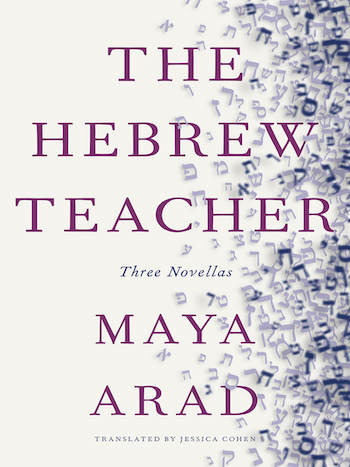Book Review: Maya Arad’s “The Hebrew Teacher” — Balancing Conflict and Compassion
By Roberta Silman
This disturbing and beautiful book concerns itself mostly with Israelis living in America, and Maya Arad has brought her characters and their stories to life in meaningful and unforgettable ways.
The Hebrew Teacher by Maya Arad. Translated by Jessica Cohen. New Vessel Press, 386 pages, $17.95
 Maya Arad is an accomplished Israeli writer, born there in 1971, brought up on a kibbutz, and educated at Tel Aviv University. For her doctorate in linguistics she went to University College London and since then she has lived outside of Israel. Now an American citizen, Arad is currently writer in residence at Stanford University’s Taube Center for Jewish Studies and lives in California with her partner Reviel Netz, who also teaches at Stanford, and their two daughters. Although this is her 11th book, The Hebrew Teacher is the first to be published in English. If this trio of novellas is any indication, we have future treats in store.
Maya Arad is an accomplished Israeli writer, born there in 1971, brought up on a kibbutz, and educated at Tel Aviv University. For her doctorate in linguistics she went to University College London and since then she has lived outside of Israel. Now an American citizen, Arad is currently writer in residence at Stanford University’s Taube Center for Jewish Studies and lives in California with her partner Reviel Netz, who also teaches at Stanford, and their two daughters. Although this is her 11th book, The Hebrew Teacher is the first to be published in English. If this trio of novellas is any indication, we have future treats in store.
This book was first published in 2018, yet the first of the three, “The Hebrew Teacher,” is as relevant today as it was six years ago. Ilana’s world is turned upside down by the arrival of a young Israeli, Yoad, in the Department of Hebrew Literature. She has been teaching Hebrew as an adjunct professor at a small Midwestern college for 45 years; although registration has been slowly going down in her classes, she has always felt she was valued. Her husband Shelley has just retired and her adult children have moved far away, but she is determined to stay put and continue to teach her students the joys of her native language. Soon, though, it is clear that Yoad’s views about Israel and the diaspora clash with hers. He belongs to the new generation of young Israelis who are horrified by the situation in Gaza — and this story takes place well before the Hamas attack on October 7th, 2023 — which he describes as “two million people in prison. Under inhumane conditions.” Unsurprisingly, they try to parse their differences.
She is beginning to regret her tirade. Even to her own ears, she sounds like a schoolteacher. But what can she do? It infuriates her that young people like Yoad don’t understand that Israel is nothing less than a miracle. They take it for granted, they cannot see that there was a hairsbreadth between its existence and … God forbid what would have happened if that country did not exist.
What unfolds is entirely predictable but heartbreaking. It is to Arad’s credit that she has created characters who are so believable, who belong to the same “tribe,” yet are so cruelly disassociated from each other. Before long Ilana’s assumptions about her place and her views on how to teach Hebrew are called into question. In the guise of a story about campus politics — including all its nasty machinations — Arad has given us a much deeper and more penetrating story about the existential questions that now hover over any discussion about the future of Israel. This is very hard to do, yet she has managed it brilliantly.

Author Maya Arad. Photo: Mira Mamon
The second novella, “A Visit (Scenes),” is a combination of a play and a story as it shifts in point of view. Here Arad breaks new ground as she tells the story of Miriam, an older Israeli widow, who has come for a three-week visit to her only child Yoram, who has worked in Silicon Valley for many years. He has finally married quite late to a woman named Maya, who has given him a son named Yonatan. Yoram and Maya have been to Israel, but this is Miriam’s first visit to America because she so badly wanted to see this new grandchild. With short takes — sometimes only a page or two — we get a full picture of what all three characters feel during this encounter. The reunion has been eagerly anticipated by Miriam but is painful for Maya and Yoram, whose finances and marriage are not what Miriam has been led to believe. We also get their back stories.
Proof of Arad’s talent is her compassion toward this sad family, whose inability to connect is so visceral and painful. Reading “A Visit” I was reminded of the early immigrant stories of Jhumpa Lahiri, how the disconnect between generations can be so profound, how ideas about child-raising can be so different, and how universal these stories are. Especially between Miriam and her son. However, there were times when I found the characterization of Maya unconvincing; at too many points she came off as a caricature of a Yuppie American who married a handsome older man too hastily. I wanted someone less mean, more rounded. Still, the pervasive urgency of the prose in this piece is well worth mentioning. By ignoring rules about point of view, Arad has given us a wonderfully full picture of the conflicts among these three people in fresh and interesting ways.
The last novella, “Make New Friends,” was the least successful for me. It centers on Efrat, an accomplished Israeli woman who has been living in the States for many years with her husband Benny and two children. Despite her PhD and her excellent job and her understanding mate, she gives new meaning to the term Helicopter Parent. Perhaps I am too old to appreciate the ins and outs of this story, but I did bring up three children and remember their sometimes challenging adolescent years well. For me, Efrat’s involvement with her daughter Libby’s life was, quite simply, unbelievable. However, by the end, when I realized that Efrat was as unhappy in some ways as her daughter — which was why she was so involved in her child’s life — I realized that even in what seemed at first to be a silly excursion into parenting resonated with some important truths.
Roberta Silman is the author of five novels, a short story collection, and two children’s books. Her latest, Summer Lightning, has been released as a paperback, an ebook, and an audio book. Secrets and Shadows (Arts Fuse review) is in its second printing and is available on Amazon. It was chosen as one of the best Indie Books of 2018 by Kirkus and it is now available as an audio book from Alison Larkin Presents. A recipient of Fellowships from the Guggenheim Foundation and the National Endowment for the Arts, she has reviewed for the New York Times and Boston Globe, and writes regularly for the Arts Fuse. More about her can be found at robertasilman.com, and she can also be reached at rsilman@verizon.net.
Tagged: Israeli Fiction, Jessica Cohen, Maya Arad, New Vessel Press
